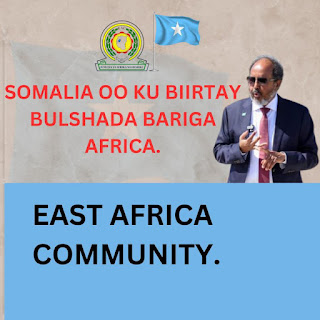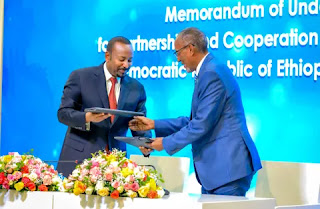Somali membership of the East African Community
Somali's recent attainment of full membership in the East African Community marks a significant milestone for our nation. This development, however, does not imply that Somalia will forfeit its sovereignty. On the contrary, joining the East African Community allows Somalia to actively participate in regional decision-making processes while retaining its autonomy.
Membership in the East African Community provides Somalia with numerous benefits. It opens up opportunities for increased trade and economic cooperation with neighboring countries such as Kenya, Tanzania, Uganda, Rwanda, and Burundi. By aligning itself with these nations, Somalia gains access to a larger market, which can bolster its economy and contribute to the overall development of the country.
Moreover, becoming a full member of the East African Community allows Somalia to engage in regional discussions and negotiations. This participation ensures that Somalia's voice is heard on matters affecting the region, including trade policies, security strategies, and environmental initiatives. By actively contributing to these conversations, Somalia can protect its interests and shape regional policies in a manner that aligns with its national goals.
Critics may argue that joining a regional bloc compromises a nation's sovereignty. However, in the case of Somalia, full membership in the East African Community serves as a vehicle for enhancing its sovereignty rather than undermining it. By collaborating with neighboring countries. East African Community (EAC) is a regional intergovernmental organization consisting of 8 member states: Kenya, Uganda, Tanzania, Rwanda, Burundi, Democratic Republic of Congo , South Sudan and Somalia
While member countries agree to work together on various economic, political, and social issues, they still retain their sovereignty and independence as individual nations.
The EAC aims to promote regional integration, cooperation, and development among its member states, but it does not seek to undermine the sovereignty of its members.
In fact, the EAC operates based on principles of subsidiarity, where decisions are made at the lowest possible level, ensuring that member states have control over their own affairs. Each member state maintains its own government, legal system, and autonomy.
However, it is important to note that regional integration does involve some degree of shared decision-making and pooling of resources, which may require member states to align their policies and regulations with the wider regional framework. This can be seen in areas such as trade agreements, customs unions, and harmonization of standards.
Overall, while joining the East African Community involves participating in a regional integration process, it does not necessarily mean that a country will lose its sovereignty.
The EAC aims to support member countries in achieving their individual and collective development goals while fostering regional cooperation and integration.
Abdullahi Mohodin Hassan (Abdullahi Yabarow)
LLM



Comments
Post a Comment